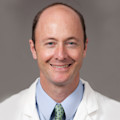
Expertise
Clinical trials, prostate cancer, biomarkers, circulating tumor cells, and genitourinary medical oncologyEducation
University of VirginiaHighlights
Board certified in medical oncology and internal medicine
Over 200 peer-reviewed publications
I am motivated by my patients and enduring their survivorship and advocacy through care, clinical and translational research, and education.
— Andrew Armstrong, MD, ScM
Experience
Andrew J. Armstrong, MD, ScM, is a tenured professor of medicine, surgery, pharmacology, and cancer biology and director of research for Duke Cancer Institute’s Center for Prostate and Urologic Cancers.
He is a medical oncologist and internationally recognized expert in experimental therapeutics and biomarker development in genitourinary cancers, particularly in prostate cancer. He has over 200 peer-reviewed publications and teaches trainees, mentees, and students at Duke University.
As a clinical and translational investigator, he is focused on experimental therapeutics for patients with advanced genitourinary malignancies. He is particularly interested in prostate and kidney cancer and the investigation of biomarkers of response and benefit both in the laboratory and in the clinic.
He is funded by the U.S. Department of Defense, Prostate Cancer Foundation/Movember, the National Institutes of Health, and the American Cancer Society for his work on circulating tumor cell biology and epithelial plasticity. He led the development of enzalutamide and its FDA approval for men with metastatic prostate cancer. He also studies hormone resistance in the laboratory and ways to overcome this in the clinic.
Dr. Armstrong was a Prostate Cancer Foundation, American Association for Cancer Research, and American Society of Clinical Oncology Young Investigator Award recipient. He co-chaired Prostate Cancer Working Group 3, which established guidelines in 2016 for clinical research in advanced prostate cancer. He has been a leading writing member of the National Comprehensive Cancer Network Prostate Cancer panel since 2012 for national clinical guidelines on the treatment of men with prostate cancer.
Education
Dr. Armstrong trained at Duke University as a biomedical engineer and received his medical degree at the University of Virginia. He completed medicine residency training at the University of Pennsylvania and his fellowship in medical oncology, hematology, and public health clinical investigation training at Johns Hopkins University and the Bloomberg School of Public Health.



